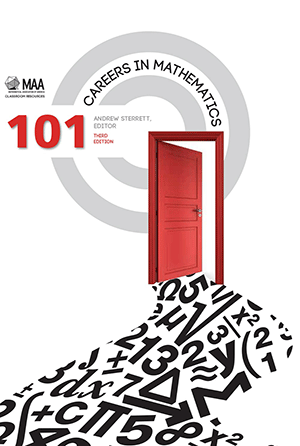 Why does a lawyer need mathematics? Does a doctor need to know equations to have a successful practice?
Why does a lawyer need mathematics? Does a doctor need to know equations to have a successful practice?
101 Careers in Mathematics features essays from 101 individuals that discuss the importance of mathematics in their careers. Readers may be surprised that many of these professionals come from a wide range of careers, including doctors, lawyers, economists, consultants, and more. Going beyond the traditional scope of academia lies a multitude of careers that mathematics majors can apply for.
From this book, readers will discover how logic, analytical thinking, recognizing patterns, and the ability to organize data --the skills learned in a mathematics classroom--will always be in high demand in the workforce.
Read some excerpts from the book:
“I attribute much of my academic success at Columbia University School of Law to having learned, through the study of mathematics... how to analyze complicated principles. Now I practice law in one of the country's largest law firms. I feel I have done well in my job, and I attribute much of that success to my facility with numbers and mathematical theory.” - Jonathan Blattmachr, Law Partner, Milbank, Tweed, Hadley & McCloy
“I thoroughly enjoy the career I've chosen, and I have no question that I wouldn't be here if I had not started my training with a degree in mathematics. The analytical problem-solving skills one develops working through a mathematics curriculum are highly valuable and transferable to any future aspiration.” - Marla Prenger, Associate Scientist, Procter and Gamble
“When seeking a mathematical position, don't be put off by titles of jobs or work units that may not seem mathematical. Mathematicians can pop up, and do mathematical work, all over the place.” - Michael Weiss, Agricultural Economist, US Department of Agriculture
If you want to see the many careers a mathematics major can do read all 101 essays in the book, 101 Careers in Mathematics:

